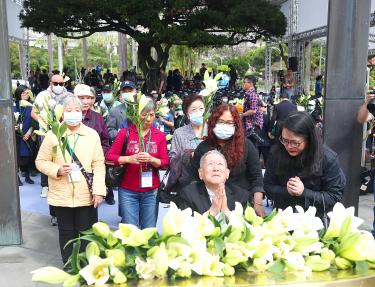President Tsai Ing-wen (蔡英文) yesterday said that she has instructed the National Security Bureau (NSB) to declassify files requested by the Transitional Justice Commission within one month, with the exception of the few that cannot be published due to legal restrictions.
Tsai made the remark in a speech at a ceremony in Taipei commemorating the 228 Incident, a crackdown launched by the then-Chinese Nationalist Party (KMT) regime against civilian demonstrators following an incident in Taipei on Feb. 27, 1947.
Regarding the files the commission has requested — such as those relating to the deaths of political activist Lin I-hsiung’s (林義雄) family members and Carnegie Mellon University assistant professor of statistics Chen Wen-chen (陳文成) — the bureau must “maximize transparency and minimize restrictions” for public use, she said.
The government’s efforts to promote human rights education would continue, Tsai said, adding that the Control Yuan’s soon-to-be-established national human rights commission should endeavor to ensure that the concept of human rights takes root in Taiwan.
The bureau later said that it is in the process of removing about 500 pages of files that include intelligence sources, agent names and intelligence shared by foreign governments, which comprise only 0.0038 percent of all documents and would be stored separately.
The remaining files that are not classified would be transferred to the National Archives Administration by the end of next month, it added.
In addition to Tsai, politicians including Premier Su Tseng-chang (蘇貞昌) and Taipei Mayor Ko Wen-je (柯文哲) joined survivors of the 228 Massacre and their families at the ceremony at 228 Peace Memorial Park (228和平紀念公園).
Tsai laid a wreath at the monument to the victims and awarded certificates that “restored the reputation” of the victims and their families, overturning the designations given to them at the time as “rioters,” “rebels” or “communist sympathizers.”
“We believe that by remembering history and reflecting on the past, we can make our society more united, more democratic and more consolidated, and move Taiwan forward,” Tsai said.
Due to concerns about the spread of COVID-19, this year’s commemoration was scaled down, as many victims and their descendants live abroad — in places such as Japan and South Korea, which are facing outbreaks of the coronavirus — and were unable to attend.
An Executive Yuan 228 Incident report issued in 1992 said that 18,000 to 28,000 people, many of them members of Taiwan’s intellectual elite, were killed during the subsequent government crackdown, which lasted until May 1947.
The 228 Incident marked the beginning of the White Terror era, during which political dissidents were suppressed, imprisoned or executed, with the nation remaining under martial law until 1987.
Additional reporting by Huang Hsin-po
Source: Taipei Times - 2020/02/29





















